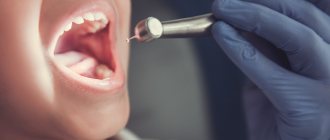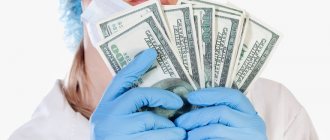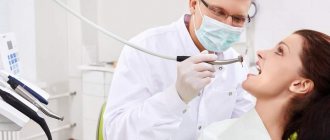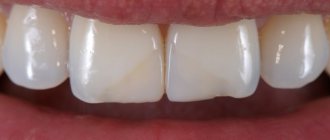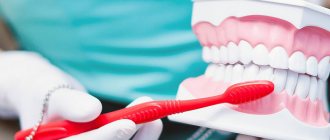What profession could a modern person not imagine his life without? Every day we meet hundreds of representatives of different fields, but day X comes, and then we start thinking about those specialists whom many are afraid of. We are, of course, talking about dentists. Many are afraid of these doctors and endure toothache to the last, so today we decided to tell you more about the dental profession and prove that these are wonderful and kind people who wish their patients only goodness and health. What specializations exist in dentistry, does this profession have pros and cons, and where should you go to study to become a dentist? Dentist-therapist Elena Bobkova answered all our questions.
Mistake number 1.
The doctor was not prepared for the patient.
What should Svetlana Nikolaevna have done?
- Collect all the information from the administrator as much as possible. In most cases, patients already tell the administrator where they are hurting, this will give them the opportunity to calmly go through all the possible diagnosis options in their head.
- Calmly think through your actions, you can even write a cheat sheet:
- I enter a resourceful state of self-confidence;
- Getting acquainted;
- I question the patient carefully;
- I take a photo;
- I carefully examine the photograph;
- If necessary, I gather a consultation. It's better to look stupid in front of a colleague than to harm a patient.
- I discuss the diagnosis with the patient and sign all the documents.
Orthopedist, orthodontist, periodontist, dentist, paramedic, dentist... What do these definitions mean, what diseases are treated by doctors of these specializations, and which of them should you contact in a particular case?
Who is a dentist? To become a dentist, you must graduate from medical school or college. A specialist with secondary medical education is trained to perform relatively simple dental procedures. This does not mean that it is not able to cope with more complex cases, but its theoretical and practical basis is limited, and does not involve performing operations on teeth of the highest level of complexity.
Who is a dentist ? Dentist is a unifying definition applied to a dental specialist with higher education. (Stoma, stomatos means mouth in Greek, logos – teaching). To become a dentist, you need to graduate from a medical academy, institute or university. The duration of their studies is at least 5 years. Along with dental diseases, future dentists study many medical sciences - biochemistry, physiology, therapy, histology, etc. They are prepared not only theoretically, but also practically, having completed a one-year internship or a 2-year residency.
What is the difference between these concepts? The difference between a dentist and a dentist is the level of training and the type of treatment they can perform. The list of works provided for by the job description of a dentist includes: A dentist is a general specialist, diagnostics; treatment of relatively simple diseases of teeth and gums - gingivitis, stomatitis, caries and some others; removal of teeth not complicated by periodontitis; treatment of simple maxillofacial injuries. Carrying out physical procedures; consultation regarding the choice of oral hygiene products (OR); cleaning teeth from plaque and tartar, and some others. In case of more serious dental pathologies - malocclusion, pulpitis, periodontitis, periodontal disease, lesions that have caused tooth destruction by more than 50%, and in other cases requiring the participation of a more trained specialist, the dentist gives the patient a referral to a dentist of the appropriate specialization.
A dentist is a general specialist. He has theoretical knowledge and practical skills sufficient to perform therapeutic, orthodontic, orthopedic and surgical operations. Although, like a dentist, when faced with a particularly difficult case, he can refer the patient to a doctor of narrow specialization.
Narrower specializations: a large number and complexity of pathologies of the dentofacial apparatus, constant improvement of existing treatment technologies and the development of new ones require in-depth, specific knowledge and skills from dentists. This feature has found its implementation in the concept of narrow specialization of dentists. Depending on the type of work performed, the following specializations of dentists-therapists differ; orthodontist; surgeon; orthopedist; hygienist; pediatric dentist. Dentists often combine several specializations at once.
Dentist-surgeon. The prerogative of the profession of a dental surgeon is the following operations: Dental surgeons often treat diseases that are within the competence of dentists of other specialties; tooth extraction; treatment of tumors in the oral cavity; elimination of TMJ dysfunctions, diseases of the salivary glands and trigeminal nerve; primary treatment of wounds and injuries of the mouth, neck, face; plastic surgery and reconstruction of jaw bones; operations on periodontal tissues (gingivectomy, gum pocket removal, soft tissue transplantations, gingivoplasty, plastic surgery of the oral vestibule and frenulum); correction of dental anomalies, implantation. Dental surgeons often treat diseases that are within the competence of dentists of other specialties: phlegmon, periodontitis, sinusitis, periostitis, abscesses, osteomyelitis. They also diagnose specific diseases, the symptoms of which may appear in the PR - syphilis, tuberculosis, actinomycosis.
Dentist-therapist. Typically, patients seeking help from a dentist first see a therapist. A dental therapist is the broadest specialization in dentistry. Typically, patients seeking help from a dentist first see a therapist, who in most cases is able to cope with their problem alone. Job description The instructions of the dentist-therapist provide for the following work: examination of the oral cavity; diagnostics; treatment of teeth (caries, pulpitis, etc.) and periodontal disease (gingivitis, periodontitis, periodontal disease, periodontitis); preparation of PR for prosthetics, its sanitation; whitening and PG of teeth; preventive examination and advice on caring for RP.
Orthopedist.
An orthopedist specializes in restoring teeth using prosthetics. A doctor of this specialization is engaged in the restoration of dilapidated, missing or lost aesthetic teeth using prosthetics. Orthopedist: takes impressions of the teeth, from which the dental technician subsequently makes a prosthesis; tries on, adjusts and secures the prosthesis on the patient. Prosthetic structures are crowns, bridges, inlays , veneers, removable dentures.
An orthodontist adjusts the position of teeth using removable and non-removable orthodontic devices. Orthodontics is a subsection of dentistry dedicated to dental anomalies. The scope of activity of an orthodontist includes: prevention of deformations of individual teeth, dentition and jaws; normalization of occlusion; correction of jaw development; teeth alignment. Correction of the position of teeth is carried out using removable and non-removable orthodontic devices - mouthguards, braces, braces.
General dentist
The specialty “General Dentistry” was introduced by orders of the Ministry of Health No. 553 and 112. This specialty is of particular importance for rural areas, where it is desirable to have a specialist who can provide assistance in several clinical areas. However, until now, due to a number of organizational, educational and legal problems, general practice in dentistry has not received proper development.
Children's dentist. Children and adolescents under the age of 17 are patients of the pediatric dentist. A child's teeth have many differences from adult teeth. This includes the presence of baby teeth, the constant renewal and formation of the dentofacial apparatus, and the inability to use certain anesthetics for children. And the reaction of children to the dental chair creates increased problems. A dentist treating children must not only be able to distinguish pathology from the age norm, detect deviations in bite and tooth formation in time, but also be a bit of a psychologist.
Hygienist. The goal of a hygienist is to prevent dental diseases. Dental hygienist is a relatively new specialization in dentistry. Its goal is the prevention of dental diseases, its field of activity is dental hygiene, proper dental care. A dental hygienist performs the following work: diagnosing dental diseases; professional teeth cleaning; disease prevention; training in proper dental care skills; educational activities (inspections in kindergartens, schools, institutions, organizations, enterprises). © Source: https://dentoland.com/lechenie/chem-otlichaetsya-zubnoj-vrach-ot-stomatologa.html
Mistake number 2.
Panic turns off the brain.
Panic gripped the doctor from the very beginning. Each of us feels a rush of adrenaline in our blood. We doctors must be able to manage this. The easiest way is to switch your attention to your breathing for a few seconds and deliberately begin to breathe more slowly. Careful preparation, by the way, is also a great way to reduce stress. Switching to something familiar also works great: for example, you can and should fill out a patient’s dental chart. This will calm you down and prevent you from missing something important. Find your own way to calm your brain. You can read a lot of useful information about how the brain works in David Rock’s book “The Brain. Instructions for use"
Study, courses and demand
Every dentist has a long and thorny career path. It all starts in one of the most difficult educational institutions - medical school. A diploma issued at the end of school does not guarantee admission to a government-funded place. Therefore, most modern specialists graduate from paid departments of medical universities. On average in Russia, studying at a medical university costs about 300 thousand per year, and this is not the highest price. The training lasts for five years, then specialists undergo residency for two years to gain experience and develop in a certain specialization. Only after this can the doctor begin to work fully.
And it would seem that the training is over. But not in medicine, since with the development of modern technologies and the improvement of materials, approaches to dental treatment also change. Therefore, a dentist must annually attend various seminars, courses and lectures to improve his knowledge and exchange valuable experience with colleagues.
Now let's talk about salary. The payment a dentist receives depends on several factors: the doctor’s experience, his place of work, and the complexity of the treatment performed. It's no secret that dentists in private clinics earn much more than their colleagues from public dentistry. However, getting into a well-known clinic with a large flow of patients is not at all easy due to high competition. In Russia, on average, a dentist earns about 70 thousand rubles, but doctors always have a chance to earn more.
Don't forget about advanced training. According to Russian legislation, dentists must improve their qualifications every five years. This can be done by attending medical conferences and courses, which we talked about earlier.
Photo from the personal archive of Elena Bobkova /
Mistake number 4
The doctor forgets to sign and discuss the informed consent form.
A young doctor usually believes that if he admits to the patient in advance that the treatment result may not be ideal, this will undermine the patient’s trust in the doctor. In fact, it's exactly the opposite. Anyone can have an instrument break in the canal, anesthesia can result in complications, and when removing upper teeth, a connection with the maxillary sinus can form, and even a piece of the root can fly into the sinus of the most experienced doctor. But! If the patient is warned about this, he will take it calmly. Both he and the doctor will have less stress, and the doctor's reputation will not suffer. And most importantly, the doctor will be able to calmly help the patient.
Important qualities of a dentist
Not everyone can become a dentist. A doctor in our time is not just a profession, it is a calling, so here you need to be a real professional and have a set of important qualities:
• let's start with the fact that a person must have a predisposition to the natural sciences, including physics, chemistry and, of course, biology;
• the dentist must be able to communicate with people and find an approach to even the most difficult characters;
• dexterity, good memory, ability to concentrate and, of course, analyze are essential qualities of a dentist;
• responsibility and patience;
• the ability to respect the fears of patients, the ability to listen and reassure a person;
• neatness and neatness.
Mistake number 5
The doctor does not tell the truth to the patient.
We interrupted the story with Svetlana Nikolaevna at the moment when she was thinking: should she tell the patient the truth? Definitely say! Feel free to look the patient in the eye and speak. Take textbooks; they always have many pages devoted to complications. This means they happen, and there is no escape from it. Anything is possible. It will be worse for your reputation if another dentist tells the truth to the patient. It will be worse for the patient if your silence and inaction worsens his health. And we all want our patients to be healthy.
Let's return to our young doctor. Svetlana Nikolaevna remembered about the breathing exercises, calmed her brain and decided to examine the hole again. This is not a connection with the sinus, it is a cyst cavity with a characteristic discharge. And here is a piece of the root. Oh! How wonderfully it all ended. Now the doctor is in a great mood. The brain has stopped panicking and can evaluate the situation critically. The doctor refers the patient to an otolaryngologist and says goodbye to him contentedly.
What hasn't the doctor done yet? One simple secret action
. It provides dense patient scheduling for both novice and experienced dentists. Write a comment of 4 words or more under the last post on our Instagram @doctorgutorova or @vakhrinairina, and we will send you the main secret of a dense recording.
Even more useful in our practical courses ⤵
Acquiring skills
- Conduct an examination and diagnose the disease.
- Ability to analyze a situation in order to develop a treatment plan in the future.
- Read the x-ray.
- In certain cases, recommend possible solutions to the problem and encourage the patient to make the right choice.
- Describe in detail the rules of oral hygiene and, in general, how to care for your teeth and gums.
Link to the professional standard: https://www.przrf.ru/docs/full/kadrovoe_regulirovanie1/Ob-utverzhdenii-professionalnogo-standarta-Vrach-stomatolog/
You will have to work with different dental instruments and special equipment. Also with medications. Some areas even require computer skills. When it comes to prosthetics, modern doctors create mock-ups in special programs and then print them on 3D printers.
Initially, the newcomer will be faced with the need to work in practice with a supervisor. In the future, doctors can work with assistants who carry out assignments (preparing instruments, recording clients).
Labor operations:
- Preparatory stage: turning on the equipment, arranging medications if there is no assistant.
- Patient reception, examination.
- Prevention, diagnosis.
- Treatment of problem teeth or oral cavity.
- Taking impressions.
- Anesthesia if removal of a tooth, nerve, etc. is required.
- Paperwork.
Obtaining medical education
Perhaps the most responsible and time-consuming process is preparing for admission to a university. It is necessary to take on it as early as possible - ideally several years before an important event. After all, any prestigious profession is in great demand and implies high competition for places. Therefore, it would be useful to take additional classes and electives. Applicants will have to write the Unified State Exam in the Russian language, chemistry and biology or provide the results of passing them at school (not accepted everywhere). Accordingly, there is no way to do without knowledge of these disciplines. The passing score for the exams can be viewed on the official website of the university.
It is worth noting that upon admission, basic medical knowledge is encouraged. Therefore, a diploma from a specialized college will be an additional bonus. Over the years of studying at a university, students will gain a huge amount of general medical knowledge. Often, information will have to be memorized in entire blocks. After all, the level of professionalism, and therefore the effectiveness of treatment, directly depends on how much a specialist understands issues of physiology and anatomy.
When answering the question of what it takes to become a dentist, it is necessary to mention the presence of practice in medical institutions. After the first year, students will be able to try their hand as junior staff at clinics. Further practice involves independent medical practice under the supervision of existing specialists. By the fifth year, students will have to decide on a specific area of dentistry.
Upon graduation, the graduate receives a diploma of higher education without the right to practice medicine. The document indicates possession of relevant knowledge and completion of a theoretical course. After successfully passing the exams, the dean’s office issues a “ticket” to the internship. This concept implies the primary postgraduate specialization of graduates in the chosen field.
Many students consider internship the most challenging and interesting period of their studies. It takes place in a dental clinic under the guidance of experienced mentors. After a year of practice, a certificate for the right to provide medical services is awarded. To obtain the status of a specialist in a narrower profile or occupy an administrative position, you must complete a residency. Thus, to become a good dentist, you will have to devote about 7-10 years to training. In addition, current specialists will need to constantly take advanced training courses.
